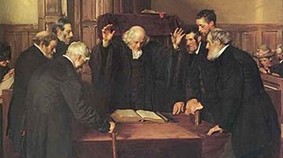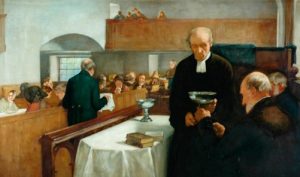ARE PASTORS AND ELDERS EQUAL?

In church governance, the distinct roles of the teaching elder (pastor) and the ruling elder are often misunderstood. Some ruling elders think themselves equal to their pastor in both rank and function, failing to recognise any distinction whatsoever. This mistaken view may tempt some to usurp pastoral authority, believing they can replace the pastor and assume his role. Such a mindset can result in serious disharmony and dysfunction within the life of a church.
For instance, in The Presbyterian Conflict, Edwin H Rian documents the theological and ecclesiastical battles within the Presbyterian Church in the USA during the 1930s. One aspect of the conflict involved questions of church governance and authority. Some ruling elders, aligned with liberal factions, sought to undermine pastors like J Gresham Machen—who upheld conservative doctrinal positions—by asserting authority in ways that bypassed traditional Presbyterian structures of eldership and oversight.
Adam Ch’ng, in his article “5 Dysfunctions of an Eldership Team,” identifies a common issue in which some ruling elders perceive themselves as an opposition party. In certain cases, these elders form power blocs within Sessions (church councils) to pressure pastors with whom they disagree to resign, or even to use their majority status to remove them from office. Such actions are often driven by a business-style leadership mentality, where elders see themselves more as CEOs or managing directors over against their pastors.
It is troubling that in modern-day Presbyterian and Reformed churches—especially in smaller congregations—conflicts over authority are not uncommon. Ruling elders may feel empowered to direct, suspend, or even terminate pastoral ministries when their preferences are not met. Such actions can arise from outside church meddling or interference, doctrinal immaturity among elders, or a failure to properly understand passages like Ephesians 4:11 and 1 Timothy 5:17, which highlight the primacy of the preaching and teaching ministry. For example, denominational records from the Presbyterian Church in America (PCA) and the Orthodox Presbyterian Church (OPC) include Session minutes where ruling elders have moved to suspend or remove pastors without due process or a sound theological basis.
To prevent such distressing and destructive outcomes, it is vital for the Bible-Presbyterian Church (BPC) to be firmly grounded in the Holy Scriptures, as faithfully expounded in the Westminster Standards with regard to church government. The eldership is undeniably a biblical institution, but it must be rightly understood and humbly practised: while teaching elders and ruling elders are equal in rank, they are not equal in function. Failure to grasp and apply this biblical truth can lead to unhealthy church splits.
One Office, Two Functions
The distinction between teaching and ruling elders is not arbitrary or merely practical—it is grounded in Scripture. Paul wrote in 1 Timothy 5:17: “Let the elders that rule well be counted worthy of double honour, especially they who labour in the word and doctrine.”
This passage reveals that all elders rule, but some are specifically called to labour in preaching and teaching. There is no mention of a separate rank or class of office; rather, there are two kinds of elders within the one office. The office of elder is singular, yet it permits a functional duality according to one’s calling and gifting.
This understanding is historically enshrined in The Form of Government of the BPC in Chapter 4, which states: “We believe that government by two kinds of presbyters, ministers and ruling elders, who are to be joined in the oversight of the Church, is founded upon and agreeable to the Word of
God, and is highly expedient.”
Hence, the BPC clearly teaches that there are two kinds of elders: (1) Pastors (Teaching Elders), and (2) Ruling Elders.
Pastor (Teaching Elder)
According to Chapter 5: “The office of the minister [pastor] is first in the Church, both for dignity and usefulness….” The pastor bears multiple biblical titles that reflect his diverse responsibilities: (1) Bishop (having oversight of the flock), (2) Pastor (feeding the church with spiritual food), (3) Minister (representing Christ in His Church), (4) Presbyter/Elder (governing the church and setting an example), (5) Ambassador (declaring the will of God), (6) Steward (dispensing God’s grace and ordinances), and (7) Servant (serving humbly before God and man).
Because of the high calling of the office of pastor or teaching elder, the path to ordination must be exceptionally rigorous and comprehensive. The candidate must (1) complete full-time theological studies at an approved seminary, and (2) undergo examination by the presbytery (or an ordination council) in the English Bible, theology, church history, the original languages of Scripture, church polity and discipline, preaching and teaching ability, his calling, and any other areas the presbytery deems appropriate.
When approved, Chapter 14 requires the presbytery to appoint an ordination service. At the service, “The candidate shall kneel… Then the presiding minister shall, by prayer and with the laying on of hands of the presbytery, according to apostolic example, solemnly ordain him to the holy office of the Gospel ministry.”
Ruling Elder
Chapter 6 defines the office of ruling elders as follows: “Ruling elders are the particular representatives of the people, chosen by them from their own number, for the purpose of joining with the pastors or ministers in the government and discipline of the Church. This office is recognized in Holy Scripture.”
Unlike teaching elders, ruling elders are not
required to undergo full-time theological or seminary training. Nevertheless, they must (1) fulfil the qualifications for the office as set forth in 1 Timothy 3, (2) be members in full communion in the church in which they are to serve, and (3) be men (i.e. male).
Although both teaching and ruling elders are ordained men, their ordinations differ. According to Chapter 12, “Of Electing and Ordaining Ruling Elders and Deacons”: “Every congregation shall elect persons to the office of ruling elder… The minister shall proceed to set apart the candidate, by prayer, to the office of ruling elder (or deacon, as the case may be), and shall give to him and to the congregation, an exhortation suited to the occasion.” Note that the ordination is performed by the minister and is done “by prayer” without the laying on of hands.
Thus, while equal in rank, there is a clear distinction in function. The pastor is one who has received a divine call to full-time ministry and is therefore entrusted with ministerial authority to preach, teach, administer the sacraments, and provide spiritual oversight—having been trained in seminary and ordained by fellow ministers (cf. Acts 6:4; 2 Tim 4:2; see The Westminster Form of Presbyterial Church-Government, under “Pastors”).
By contrast, the ruling elder is typically a biblically qualified and spiritually mature layman, elected to share in church governance, offer counsel, and assist in matters of discipline. He does not ordinarily possess the ministerial authority reserved for pastors.
Again, The Form of Presbyterial Church-Government, under “Other Church-Governors,” makes this distinction clear: “As there were in the Jewish church elders of the people joined with the priests and Levites in the government of the church; so Christ, who hath instituted government, and governors ecclesiastical in the church, hath furnished some in his church, beside the ministers of the word, with gifts for government, and with commission to execute the same when called thereunto, who are to join with the minister in the government of the church. Which officers Reformed churches commonly call Elders.” In other words, just as the ruling elders worked alongside the priests in governing the Temple in Israel, so too do ruling elders serve together with pastors in the government of the Church. These elders—whether in Israel or in the Church—do not take over or encroach upon the functions of the ordained minister, but serve supportively as godly counsellors and disciplinarians, ensuring the spiritual well-being and good order of the congregation.
The pastor and ruling elders form the Session (or Board of Elders), the church’s governing body. The distinction between them is not one of rank, but of calling and role. A healthy church depends on their mutual respect and unity, with decisions preferably made by consensus. All have equal votes; in the event of a tie, the pastor, as chairman, casts the deciding vote.
Complementary Roles of Elders
The BPC has long emphasised the biblical warrant for a plurality of elders, and the complementary roles of teaching and ruling elders. This plurality guards against unilateral decision-making, ensuring a spirit of collective wisdom under Christ (cf. Prov 11:14).
Yet in practical experience, the pastor or teaching elder often functions as the visible leader who sets the spiritual direction of the church, owing to the public nature of his ministry—preaching and teaching the Word, leading in worship and prayer, administering the sacraments, chairing meetings, and more. However, this public role in no way diminishes the importance and necessity of ruling elders. The strength of Presbyterian polity lies not in clerical dominance, but in shared spiritual oversight under the supreme authority of Christ and His Word.
The distinction between teaching and ruling elders, when rightly appreciated, is not a matter of rank but of calling. In the BPC, both offices are essential and perpetual. May all elders—whether preaching the Word or ruling well—serve the Lord with truth and charity, remembering that they are under-shepherds of the Great Shepherd, who alone is the Head of the Church (1 Pet 5:1-4). JK

“Feed the flock of God which is among you, taking the oversight thereof, not by constraint,
but willingly; not for filthy lucre, but of a ready mind” (1 Pet 5:2).

